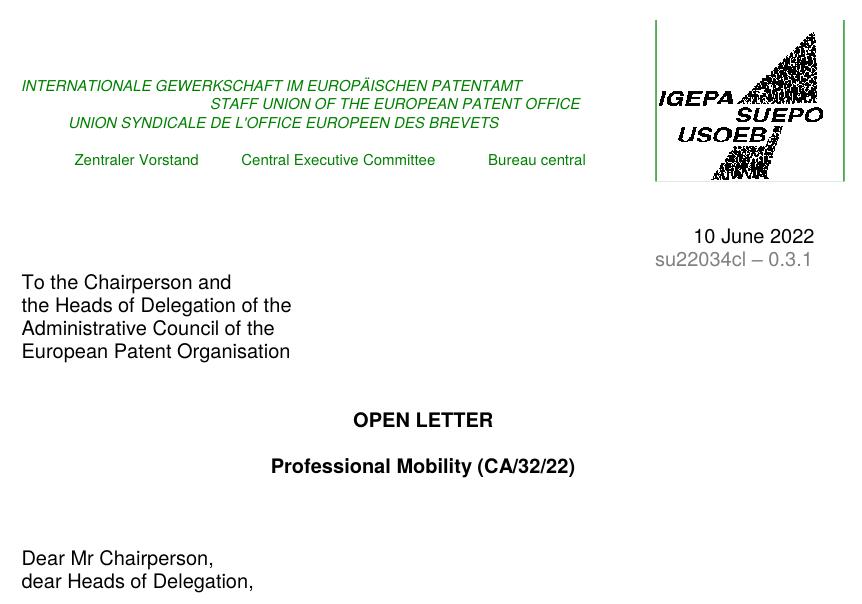

Professional Mobility (CA/32/22) isn't as lovely as it sounds and it's not even legal
THE EPO's staff union, SUEPO, has written to national representatives about 19 days prior to this month's meeting, which will also decide the future (or lack thereof) of António Campinos. Remember that Campinos performed no better than Benoît Battistelli; he perpetuates the same illegal agenda, including European software patents.
"Remember that through so-called 'cooperation' agreements (money) the EPO tends to bribe the so-called 'voters', so they end up voting in favour of illegal proposals."SUEPO Central wrote the following "OPEN LETTER" on Professional Mobility (CA/32/22), explaining to union members, various colleagues, and maybe other stakeholders (it's an open letter after all) that this letter "has been sent to the Delegations of the Administrative Council. The proposal CA/32/22 is in the agenda of the 171th AC meeting of 29 June 2022."
As usual, EPO management is breaking the law and violating the EPC rather directly. How can any sober delegate not see this and accordingly antagonise it? Remember that through so-called 'cooperation' agreements (money) the EPO tends to bribe the so-called 'voters', so they end up voting in favour of illegal proposals. That is how defunct and corrupt this institution has become!
Here's what the letter says:
10 June 2022 su22034cl – 0.3.1
To the Chairperson and the Heads of Delegation of the Administrative Council of the European Patent Organisation
OPEN LETTER
Professional Mobility (CA/32/22)
Dear Mr Chairperson, dear Heads of Delegation,
At the 171th meeting of the Administrative Council the package of the measures gathered under the title "Professional Mobility" with number CA/32/22 is on the agenda. By a CSC letter dated 17.05.2022 you have been informed already about the flawed consultation of the EPO staff representation on the underlying President’s proposal GCC/DOC 06/2022, such that a decision of the Administrative Council on CA/32/22 at this stage would be affected by severe legal uncertainties.
Moreover, already a superficial lecture of the document raises very worrisome concerns about the future working conditions of the staff being seconded under the framework to be established by the proposal.
Relating to the secondment of EPO employees to private or public bodies, the following topics are a source of concern and must be clarified before adoption:
- The lack of indications in the document on whether or not EPO employees may or should perform tasks within the Departments defined by Article 15 EPC, while being seconded to a public or private body at the same time; - The absence of any information on the scope and limits of tasks compatible with the secondment to public or private bodies; - The omission of essential details like the salary scales and allowances to be paid to seconded EPO employees, when performing tasks out of their place of employment; - The potential loss of immunities for the EPO employees seconded to public or private bodies, which may lead e.g. to loyalty conflicts, unexpected tax burdens or to immigration hurdles; - The lack of definition of the jurisdiction available to EPO employees for disputes arising during or derived from secondment.
With respect to the secondment of national experts to the EPO, we believe that seconded national experts may earn factual or legal entitlement to an employment at the EPO,
whereas their selection and supervision fall out of the powers of the Office, which de facto would bypass the internal selection procedures of the EPO. Further, it is not apparent that seconded national experts can enjoy the privileges and immunities of EPO employees, which may have consequences for them relating taxation or immigration.
We are very concerned about the fact that the proposal CA/32/22 implies full financing by the EPO of activities well beyond its core activities and thus incompatible with its mission. It is also remarkable that, according to this proposal, both seconded EPO employees and seconded national experts to the EPO will be mainly paid in the future by the Office, which surely will affect the financial results of the EPO in the long term.
We further suspect that the adoption of CA/33/22 may jeopardize the validity of the sovereign acts emanating from the competent departments of the Office, which may affect the Organisation's immunity from jurisdiction and execution under Article 3 PPI. We also think that the inviolability of the documents and archives of the Organisation can be hardly guaranteed under the framework created by the proposal.
We therefore request that the Administrative Council in its 171th meeting consider the proposal CA/32/22 as a document for information rather than for decision, pending a valid consultation and the required clarifications described in the present letter.
Finally, the wide range of the aims of the document allow for an ample decentralisation of the EPO operations. Beyond the apparent incompatibilities with the EPC, the Protocol Privileges and Immunities or the Centralisation Protocol, we believe that the timing for a decentralisation of the EPO is not appropriate in view of the recent perturbing political challenges for Europe, which require the strongest unity among the Member States. For these reasons, we suggest that the Administrative Council suspends the adoption of the professional mobility package until the celebration of the next Conference of ministers under Article 4a EPC.
Yours sincerely,
Thomas Czogalla
Acting Chair of the SUEPO Central Executive Committee
Copy: President of the European Patent Office, Mr. A. Campinos